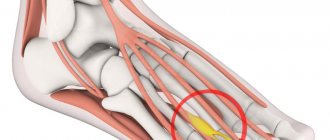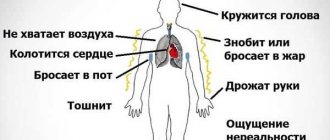Only recently you were in seventh heaven, but now you are angry. Your loved ones reproach you that you and your mood swings are simply unbearable. Be careful: this could be a sign of something serious!
It happens that we are not aware of our behavior at all. We don’t notice that at first we are joyful, full of enthusiasm, and a little later we are sad, sentimental, and tearful. We easily move from euphoria to anger, within one hour we manage to fall into hysterics and burst into bouts of hysterical laughter. We don't see a problem until someone points it out to us. Have you also heard about yourself that your mood is too changeable? Don't underestimate this.
“Emotional swings” are usually characteristic of women. They involve experiencing extreme emotional states. In men, they are very rare, moreover, such lightning-fast changes in mood are often difficult for them to understand, and can be the object of jokes and sarcasm. Meanwhile, the problem is not so trivial. Hormonal changes are responsible for mood swings - often, but not always: they can be caused by something else.
Stress and anger
Each person deals with them differently. For some it works out better, for others it works out worse. When stress begins to overwhelm you and you cannot find an outlet for negative emotions, mood swings are very likely to occur. For many people, the reaction to prolonged stress is precisely sudden changes in their emotional state. Some women either scream, or cry, or swear with their partner, or want to immediately be in his arms. To prevent this from happening, you need to give vent to your negative emotions in another way.
Depression
This is one of the most serious so-called diseases of civilization. According to the World Health Organization, more than 350 million people may suffer from depression! Despite its prevalence, we do not know very much about this disease. It often seems to us that depression manifests itself as a constant feeling of sadness, apathy, and an inability to have fun. This is true, but not only that. Sometimes depression manifests itself precisely as mood swings, and with a tilt towards negativity. Some people in this state can be angry, even aggressive, and overly loud. It should be remembered that this disease can and should be treated, it is not a reason for shame.
Addiction
Excessive use of alcohol and drugs (cocaine, amphetamines) can negatively affect your emotional state. This is because they initially cause a significant improvement in mood (it’s no coincidence that drugs are referred to as a high), increase energy, and boost self-esteem. But when the substances stop working, the person taking them may experience a feeling of complete depression. Remember that dependence on alcohol and psychotropic substances harms not only your physical health, but also your psyche.
Lack of sleep
Sleep is essential for the body to function properly. In this sense, he will not allow himself to be deceived. Sleeping until noon on weekends or in fits and starts throughout the week is wrong because it violates sleep hygiene. You need to rest regularly, 7-9 hours a day. Scientific research has confirmed that just one sleepless night already worsens a person’s psychophysical form. It has been noted that sleepless nights make us more aggressive. Lack of sleep primarily leads to mood disorders and emotional instability.
Bipolar disorder
This is a mental disorder from the affective group. People with this disorder often experience episodes of mania and depression. At first they are excited, hyperactive and excitable, but soon become depressed and “disconnect” themselves from the world. Typical symptoms of a manic episode include racing thoughts, decreased need for sleep, increased energy, hallucinations, and inflated self-esteem. Depressive episodes are characterized by decreased mood and self-esteem, problems with concentration, slowed thought processes, and thoughts of suicide. If you suspect this disease, you should consult a psychiatrist.
To get started, you can take a psychological personality test. famous American psychologist Albert Ellis.
Premenstrual syndrome
Are you worried that your mood swings may indicate an illness? But it could be “just” PMS. From some studies it follows that every second woman experiences premenstrual syndrome. Typical symptoms appear a few days before the start of your period and subside after it begins. In this case, in addition to mood swings, irritability, excessive appetite, headaches, chest pain, back pain, aggression, tearfulness, difficulty concentrating, sadness, swelling, a feeling of heat, fatigue, and vision problems are observed.
Menopause
The average European woman experiences this phenomenon at the age of 49. When the level of key hormones drops in a woman’s body, the body reacts to the decrease in a certain way. The disappearance of periods is one thing. Menopause also comes with other symptoms that can be quite distressing. We are talking, in particular, about mood swings, as well as hot flashes, insomnia, and excessive sweating. A decrease in the production of estrogen, the most important female hormone, is responsible for this. Sometimes menopause can begin prematurely and in its early version affect women under 40 years of age.
Other reasons
There are other reasons that can cause a sharp change in the emotions experienced. You may be surprised, but diet, for example, is responsible for our mood. In particular, sudden mood swings can be associated with excess caffeine and sugar. A head injury or brain tumor may also be responsible for extreme emotional states. Individuals with a borderline state, which is something between neurosis and schizophrenia, have a similar problem. The condition of such people is called stable instability. Typical for them are not only mood swings, but attacks of severe anger, unstable self-esteem, serious anxiety, lack of meaning in life, and aggression directed at themselves.
Tags: Depression
- Related Posts
- Nightmares
- How to get rid of depression on your own
- Spring depression
« Previous entry
Bad mood in cloudy weather: lack of sun, depression or reaction of a healthy body
It's cloudy, damp, and chilly outside. How can you imagine that we have to live with this weather until the end of March-April, we just give up. Are you familiar? The reasons for the seasonal blues couldn’t be clearer, experts on the Internet assure. The sun directly affects the production of the “joy hormone” serotonin. The less sunlight there is, the less “fuel” we have in our brains for a good mood. Therefore, since the end of autumn and winter, sales of antidepressants have been increasing in Russian pharmacies, representatives of pharmaceutical retail chains report. People are also increasingly relying on natural “mood improvers”: coffee, chocolate, alcohol.
How justified is all this, how does seasonal worsening weather actually affect our body, and how can we help ourselves if we’re feeling blue? We talked about this with an experienced psychiatrist, host of the YouTube channel “Video blog about the psychiatry of Dr. Gilev” Artem Gilev.
In the new year - with new meanings! The doctor told how to avoid post-New Year's depression
00:00
00:00
THE MORE SEROTONIN, THE BETTER YOUR MOOD - THIS IS A MYTH
- In fact, a person can have elevated levels of serotonin, and at the same time - complete apathy, persistent melancholy and other signs of depression. The fact is that there is no 100% correlation between our emotions and a certain level of certain neurotransmitters in the brain, the doctor immediately refutes the common misconception. — By the way, the main part of the same serotonin is produced in the intestines, and not in the head. And if you, for example, take a blood test for serotonin levels, you will see its indicators in the intestines.
— Is there a scientific explanation why we still feel sad and sad in cloudy weather?
— Several options are possible. First : you are an absolutely healthy person from a psychiatric point of view. And it’s quite natural that bad weather, like any unfavorable factor, worsens your mood. This reaction is characteristic of all living beings. At the same time, a sad mood and apathy quickly disappear if, for example, urgent matters arise that require a lot of effort. Then the person is completely distracted from thoughts about the weather. Or factors that bring pleasure appear - communication with loved ones, food, shopping, etc.
The second option is when a person has a so-called recurrent depressive disorder. It is characterized by recurrent episodes of depression. That is, a person feels normal, then a period of depression sets in. And such fluctuations occur throughout the year. Often the next depressive episode coincides with the end of autumn, winter. In these cases, you can find references to SAD - seasonal affective disorder. Let me emphasize: we are talking specifically about people with illness, depressive disorder. Throwing yourself into work, hobbies, and even active recreation, as a rule, cannot correct this situation. Medical attention required.
CHECK YOURSELF
Assessing our mood
Even if it seems to you that your mood is at zero all the time, remember: are there bursts of joy, enthusiasm, or any other positive emotions against the background of despondency? Imagine your favorite activities: are they attractive? If you answer “yes,” then you most likely have a normal response to bad weather (how to quickly cheer yourself up - see below).
If your gloomy state of mind is not interrupted by anything, no activities make you happy, no activities give you energy, then most likely you are faced with a depressive disorder or another psychiatric disorder (only a doctor can determine for sure). “People often think: I have circumstances, a significant reason for difficult experiences - for example, the loss of a loved one or a beloved animal. This means that a bad mood is justified, and there is no talk of depression,” says Dr. Gilev. - It's a delusion. If the body is healthy, then even the most severe tragedy cannot lead to an excessively long period of decline in mood. If the emotional state does not recover within six months , then we are definitely talking about a serious stage of depression or another disease.”
If there are no serious tragic circumstances, then a bad mood should not persist continuously for more than one and a half to two weeks, say psychiatrists. If this condition drags on longer, it may be a warning sign of the development of depression.
WHAT TO SAVE?
— Artem Andreevich, what can you say about the growth in sales of antidepressants? Apart from their side effects, is this really the most reliable way to cheer up, as many people believe?
“Antidepressants will only help if a person really has a depressive disorder,” the psychiatrist opens his eyes. “It makes no sense for a healthy person to take them; they will not give a mood-enhancing effect.
For patients with depression, medications alone may also not be enough. Another treatment method is psychotherapy. There are several varieties of it, the two most common are psychoanalysis and cognitive behavioral therapy. Psychoanalysis has been popular for a long time, but has already fallen out of fashion in the West and the USA (it is still widespread in Russia). Research shows it is only slightly effective. But cognitive behavioral therapy works great. This is confirmed by evidence-based medicine.
HELP "KP"
— Psychoanalysis is built on a long and painstaking ascertainment of the deep origins of the patient’s problem. The person is asked to speak out, this can last for hours until some “clue” is found. “The problem is that it is not always possible to find an effective way to solve the problem after this. Mere awareness of it does not mean that a person will feel better,” explains psychiatrist Artem Gilev.
— Cognitive behavioral therapy aims to educate the patient. That is, first of all, skills are instilled in him, behavior algorithms are given that are most effective in a given situation. Even without getting to the bottom of the deep sources of depression, you can use certain techniques that will in any case give a positive result, psychiatrists assure.
PSYCHIATRIC ADVICE
How to cheer yourself up if the sun doesn't show up for a long time
1. “Establish your nutrition, ” urges Artem Gilev. — Numerous scientific studies show that it is best for both the body and the brain to eat in the spirit of the Mediterranean diet. This means: more vegetables, fruits, fish, olive oil. I recommend excluding alcoholic drinks other than dry red wine. Vodka, as well as beer, and low-alcohol tonics are harmful.”
By changing your diet, you will definitely improve your body's condition. And mental too.
Important: unhealthy diet - excess sweets, animal fats, fast food - leads to the development of atherosclerosis. With severe atherosclerotic lesions of the cerebral vessels, the risk of developing dementia (dementia) in older age increases.
2. Physical activity is another effective method of combating low mood. “Just three hours of exercise a week already produces tangible results,” explains the expert. “Exercise definitely improves your mood and helps fight fatigue, giving you vigor.”
3. Full sleep.
Lack of sleep has been proven to contribute to the development of depressive disorders. Or at least has an adverse effect on a person’s emotional state.
By the way, the latest scientific data have shown that if you can’t get enough sleep on weekdays, then extending your sleep on weekends can be beneficial for the body.
Depression is not a sign of weakness
Certain moments in life that require perseverance, extreme levels of tension, and stress factors put us before a choice and force us to act somehow. And if a person with the “I can’t do anything” attitude encounters this, he can easily break down.
However, on the other hand, one should not think that strong people have an absolute guarantee of resisting depression, because this disorder can befall anyone at any time in life. Very often it is strong people who break down because they do not want to share their problems with those around them.
Remember that you should not remain silent about depression and be afraid to seek help. This is a disease like any other. And it can be defeated!
Loss of interest in life
In this case, problems arise in the cognitive sphere. A person is not interested in the world around him, does not want to listen to news, read books, what he has is enough for him, but he does not want anything new. Such people are always sad and live in their own world.
Due to the fact that mental, motor, and speech activity decreases, a person doubts his capabilities and abilities. He is sure that a nonentity completely loses the meaning of life.
In difficult situations with hypothymia, a person believes that he cannot live normally, engages in self-flagellation, blames himself, and wants to commit suicide.
Due to the fact that a person does not see further prospects, he stops making plans and dreams. It is dangerous when neurological, psychosomatic, cardiac, gastric, and intestinal symptoms still appear.
The patient suffers from strong pressure in the chest and abdomen, feels lethargy, weakness, and apathy. In some situations, even taste changes. In addition, constipation and nausea begin to bother me.
Causes of low mood
The causes of depressive disorders are not fully known. Various factors can provoke such behavior, ranging from social disadvantage to external economic and political problems.
If we consider this pathological decrease in mood from the point of view of a symptom of depression, then its etiology will also not be fully understood. There is a high probability of a hereditary factor in the development of melancholy and depression.
Hypotymia can occur against the background of chronic somatic diseases. Psychiatry also introduced the concept of environmental stress as a cause of pathology. This concept refers to a combination of psychosocial, socio-ecological and ecological factors. Their effect on the body leads to disruption of defense mechanisms, decreased resistance to stress, and the emergence of psychological problems.
Hypothymic personality type
A previously changeable and labile person always becomes gloomy and depressed.
Positive emotions in this state are usually superficial, very weakly expressed, quickly exhausted, or completely absent.
Hypothyms see only negative aspects in any event. They perceive the world in gray and black tones and do not expect anything good from life. Such individuals are prone to self-flagellation and self-deprecation over the most insignificant reasons. Hypothyms blame themselves for absolutely everything; they inflate the slightest trouble to unimaginable proportions.
Such people have low self-esteem. Hypotims are always waiting for tricks and troubles. This forces them to play it safe, do their work with special care, and attach a lot of importance to the little things. Such tactics allow hypothymic individuals to become very responsible workers, but they never show initiative or apply innovative work methods. They try to avoid everyone's attention.
Since hypothymic people have a hard time experiencing any smallest troubles, they may not be able to cope with real grief. In such situations, it is very important that loved ones surround the hypothym with care, support and understanding.
Causes of hypothymia
The most common causes of hypothymia are:
- Intoxication;
- Traumatic brain injuries;
- Somatic diseases;
- Family problems;
- Unrequited love, strong emotional experiences;
- Low academic performance, devaluation of successes and achievements by people around them;
- Diffidence;
- Stress;
- Difficult life situations;
- Sleep disturbance.
Mood disturbances can be a symptom of certain mental illnesses: depressive syndrome, chronic schizophrenia, cyclothymia. A depressed state appears during withdrawal symptoms in drug addicts.
RELATED MATERIALS: How to overcome self-doubt and increase self-esteem










